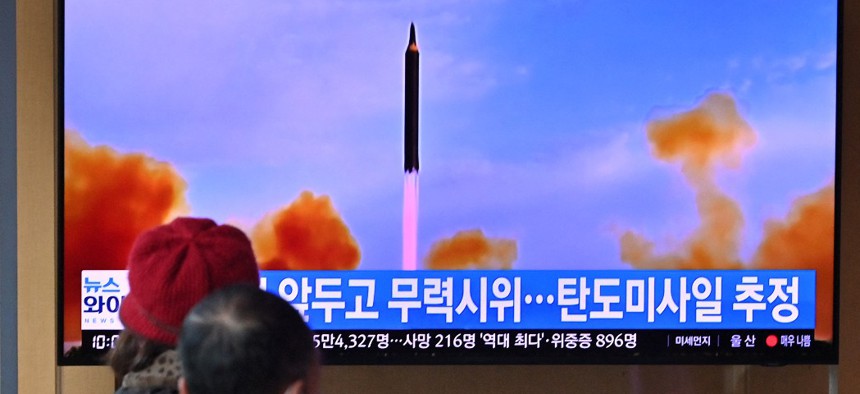U.S. to Target North Korea’s Technology Access In Response to Recent Missile Tests

People watch a television screen showing a news broadcast with file footage of a North Korean missile test, at a railway station in Seoul on March 5, 2022, after North Korea fired at least one "unidentified projectile" in the country's ninth suspected weapons test this year according to the South's military. JUNG YEON-JE/AFP via Getty Images
A “range of further actions” are anticipated for the coming days, an official said.
After concluding that North Korea tested a relatively new intercontinental ballistic missile system, the U.S. government is preparing to restrict that East Asia-based nation’s access to certain foreign technologies, a senior administration official confirmed on Thursday.
“The [Democratic People's Republic of Korea, or] DPRK’s decision to pursue escalating tests of ballistic missiles risks raising tensions and destabilizing the Indo-Pacific,” the official said during a call with reporters. “While the door remains open to diplomacy, the United States will take all necessary measures to ensure the security of American homes, the American homeland and our allies.”
Federal insiders conducted a deep analysis and ultimately determined that ballistic missile tests North Korea led on February 25 and March 4 involved a noticeably new version of the weapon system. While it was unveiled initially during a parade in October 2020 and in an exhibition in October 2021, actually employing this system marks “a serious escalation,” the official added.
“These launches are likely intended to test elements of this new system before the DPRK conducts a launch in full range, which they will potentially attempt to disguise as a space launch,” the official added.
This assessment was made in close coordination with Japan and the Republic of Korea. Details were shared with the United Nations and other international partners. Further, the “big launches” are a “brazen violation of multiple United Nations Security Council resolutions,” according to the administration official.
Referring to measures the U.S. is pursuing in response to this “escalation,” the official noted that earlier this week, the Indo-Pacific Command ordered intensified intelligence and reconnaissance collection activities in the Yellow Sea—and enhanced readiness among America’s ballistic missile defense forces in the region.
“And tomorrow, the Department of Treasury will announce new actions to help prevent the DPRK from accessing foreign items and technologies that enable it to invent prohibited weapons programs. There will be a range of further actions in the coming days,” they added. “These actions are intended to make clear to the DPRK that these unlawful and destabilizing activities have consequences, that the international community will not accept these actions as normal and, most importantly, that the only viable path forward for the DPRK is through diplomatic negotiation.”
Further details regarding the impending moves by Treasury were not provided during the call.
“We do not tend to preview the details of Treasury actions because it raises flight risk,” another administration official told Nextgov in an email after the briefing. “More to come tomorrow.”






